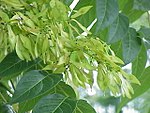Portal:Plants/Selected article/6
Ailanthus altissima, commonly known as tree of heaven, ailanthus, or in Chinese as chouchun, is a deciduous tree in the quassia family (Simaroubaceae). It is native to northeast and central China as well as Taiwan. Unlike other members of the genus Ailanthus, it is found in temperate climates rather than the tropics. The tree grows rapidly and is capable of reaching heights of 15 metres (49 ft) in 25 years. However, the species is also short lived and rarely lives more than 50 years. Other common names include China sumac, copal tree, stink tree and ghetto palm.
In China the tree of heaven has a long and rich history. It was mentioned in the oldest extant Chinese dictionary and listed in countless Chinese medical texts for its purported ability to cure ailments ranging from mental illness to balding. The roots, leaves and bark are still used today in traditional Chinese medicine, primarily as an astringent. The tree has been grown extensively both in China and abroad as a host plant for the ailanthus silkmoth, a moth involved in silk production. Ailanthus has become a part of western culture as well, with the tree serving as the central metaphor and subject matter of the best-selling American novel A Tree Grows in Brooklyn by Betty Smith.

